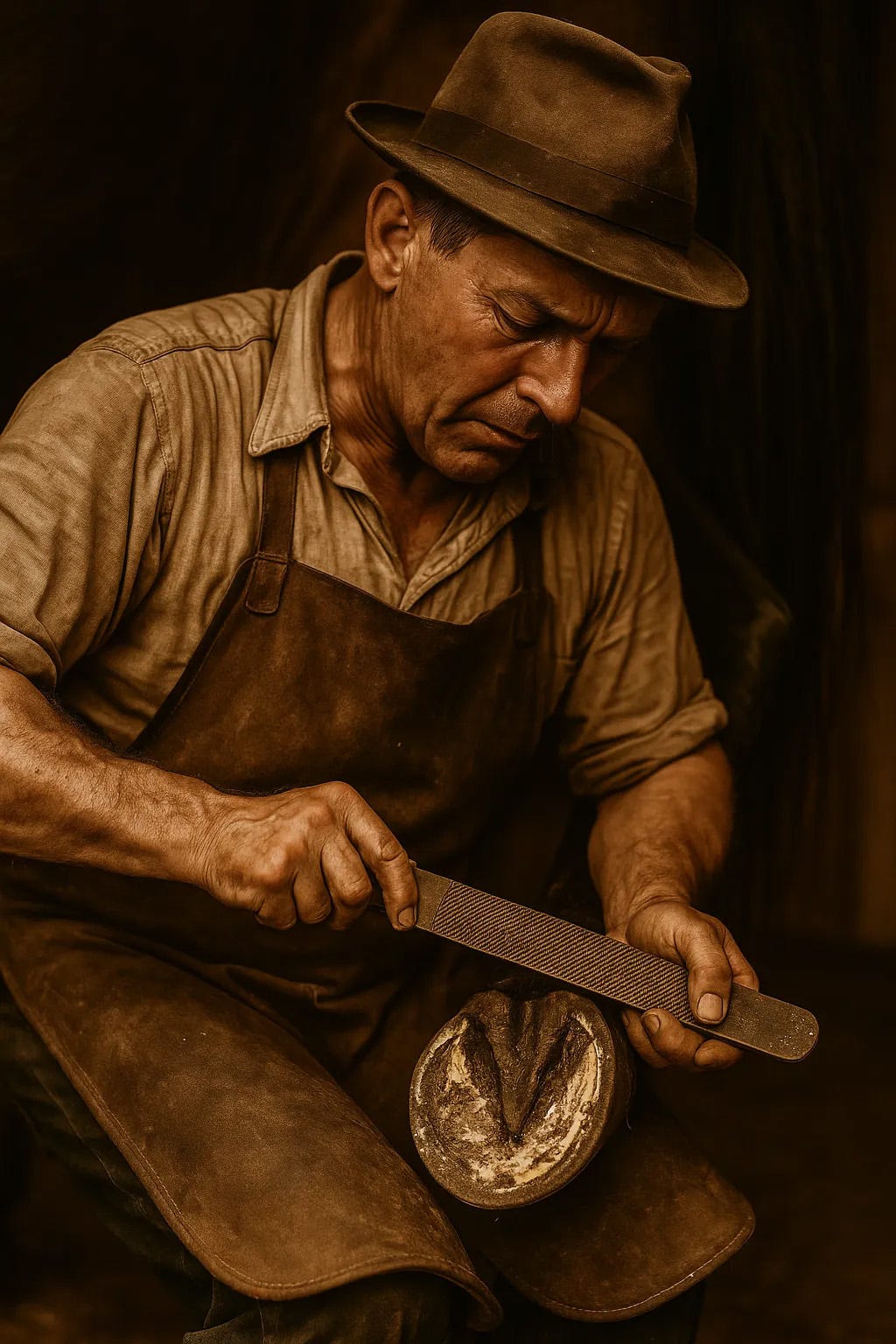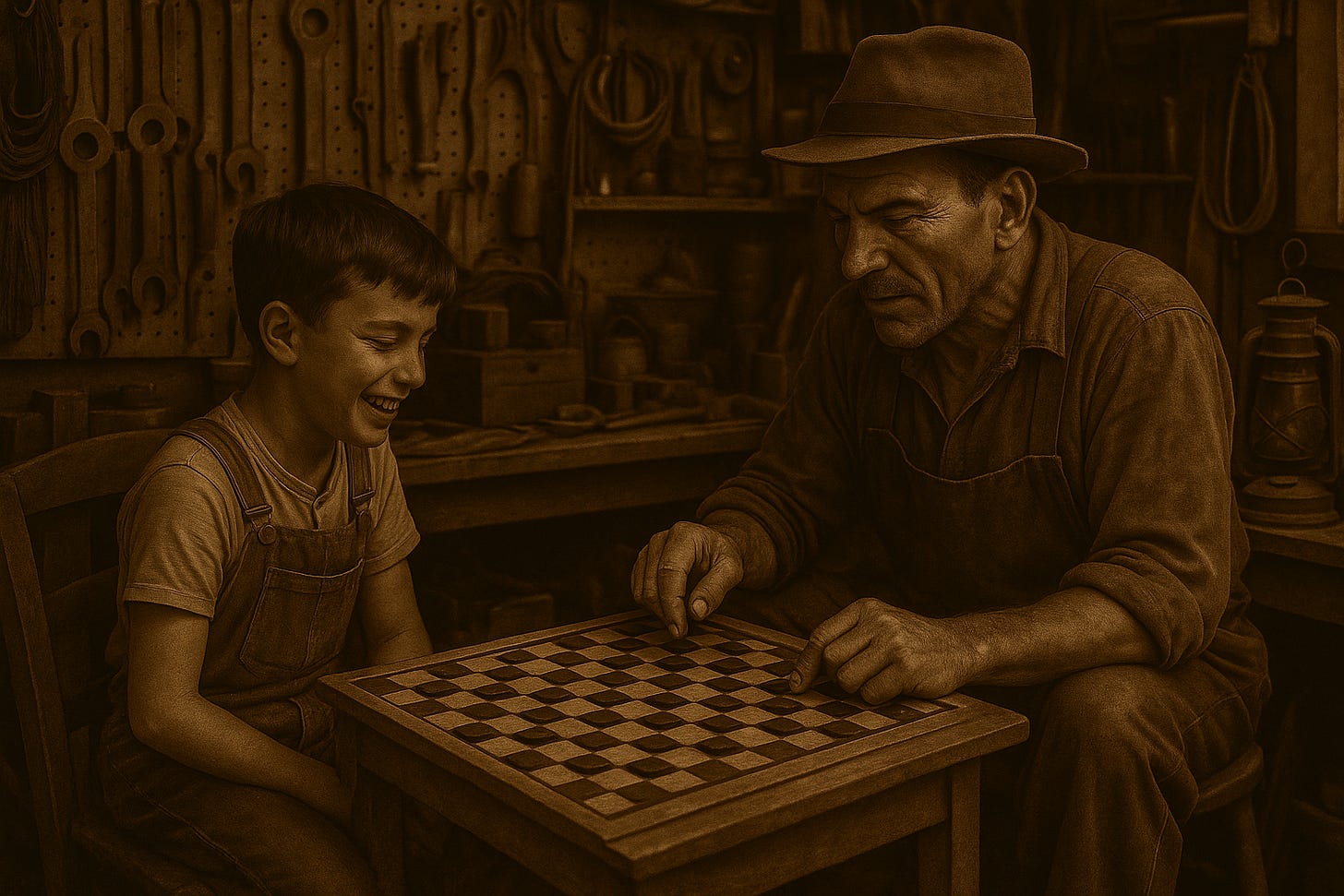Mr. Ward
#3 in the series, "A Legacy of Stories." Written by my dad, Forest Jordan
(Read about A Legacy of Stories, here.)
Resting across the top of a large mirror in our dining room is a five-foot bow. The homemade bowstring is long gone but the bow itself looks strong and seems to be waiting for a new string. I take it down once in a while. I look at it and remember back six decades to Mr. Ward.
Fred Ward was his proper name. He was a blacksmith who retired from his trade. “I haven’t worked a lick in ten years, “he said the first day I met him. That would mean he probably gave up the trade in the twenties when the internal combustion engine was replacing horses everywhere.
To say that he had given up his trade wasn’t quite true. Occasionally farmers brought plow points to his shop to be reshaped and sharpened. He kept a forge and work bench plus an anvil and tools of his trade in the garage-turned-smithy. I watched with wonder on those rare times when farmers brought their horses to him for shoeing.
It was a scene out of the past. Picture: a man wearing a leather apron and holding a horse’s hoof across his knee, trimming and shaping the big hoof with a rasp, getting it formed and cleaned for the shoe. All the while sweat was running off his nose.
And it was a nose worthy of Mount Rushmore. In appearance he was a short man, not above five feet six, with big legs and arms reaching from his sloping shoulders. He had large, meaty hands - capable hands. Slightly stooped, he wore the wide greenish suspenders popular as working clothing of that time. You could not say that he was fat. All in all, he had a peculiar build. His hair was gray with traces of brown. He wore a tired cap, and rounding out his ensemble were slip-on shoes. They were known as Romeos and sold as bedroom slippers.
He was good natured man in his seventies with still a lot of boy in him. He loved a good laugh. He would take his smelly pipe out of his mouth let out an explosive guffaw. Politicians were his favorite target. He also viewed education with amused contempt.
He was a Vermonter and though he had been away from there many years, his tongue remained true to his soft eastern accent. He was apprenticed for five years in that state and said he had on occasion shoed horses for Rudyard Kipling when Kipling lived in Vermont in the 1890s.
Mr. Ward was a true craftsman and made his own tools, knives, hammers, tongs, pliers, etc. I liked to hang around the forge and watch him fire it up. It was about five feet square, stood about table height. The center was dished and lined with brick. He blew upon the fiery coke with a hand cranked fan and occasionally augmented this with a big leather bellows. The forge was noisy, smelly, and hot and I liked it a lot. He would pull a white-hot metal rod from the fire with tongs, lay it on the anvil and beat it, sending hot sparks flying. Then he plunged it into a bucket to temper it. The piece might become a tool or a piece of filigree.
He took a penny and made a shiny copper ring for me and did the same for my sister, Willa. My finger took on a shade of green. And he made me a hunting knife. The handle was of deer antler. It had a calfskin case with copper rivets. He ran the blade up his arm and shaved off some hair. Mom wasn’t too keen about that knife but if was pure gold to me. Then one day it disappeared. I never knew what happened to it and I hated to have to tell Mr. Ward it was gone but I finally did. He took it well.
One day Mr. Ward thought it would be fun to take up archery. He bought three hickory fence posts at the farmers cooperative and stood them in the corner of his shop. They stood there for months, curing, he said then when I had forgotten all about them, he brought one over to his bench and began to shape a bow from it. It was good straight grain and it split well. Then he put a quarter of the post in his vise and began shaping it with a draw knife. A draw knife is a blade about a foot long with a handle on both ends. You pull it toward you to shave the wood.
Mr. Ward made three good bows. Mine was a five-footer with a forty pound pull, Willa’s had a 30 pound pull and Mr. Ward’s bow pulled at sixty pounds. He twisted strong threads together and coated them with beeswax to make the bowstrings. They worked fine. Then he made arrows and put metal tips on them for targets. A bale of hay on a stand and some homemade targets and we were into archery. We were a long way from expert, but we had fun.
When the weather was bad, we played checkers. Once after a few games at the board, he showed me his prize possessions: a 44-caliber Colt pistol and a musket. The pistol was so heavy I couldn’t hold it at arm’s length. The bore of each piece was shiny and clear of pitting. The musket was taller than I.
When the weather was warm, he liked to walk downtown to the park and discuss the state of the world with cronies. He was a strong advocate of the Townsend Plan which offered an income for retirees. It never came about but may have hastened the advent of Social Security.
He must have lived on a pretty tight budget. I think he had some assistance from public welfare. Like everyone in those days, he found ways to economize. On the way to the park, he stopped at the drug store to spruce up and helped himself to the demonstration electric shaver. He bought his eyeglasses at Woolworth. They had steel rims. For close work he put one pair over another. I must confess I was fascinated by him. He could make just about anything he wanted. He was entertaining and patient with a tag-along kid and probably enjoyed the adulation.
Eventually he and his wife moved away and I didn’t see him for many years. One day while visiting home, I was downtown with Mom and she said, “Let’s drop in on Mr. Ward.” I was surprised, “Is he still alive?” “Yes, he’s well into his nineties.” He and Mrs. Ward were living in a small apartment nearby. He hadn’t changed much in appearance nor attitude. “Whatcha been doin’?” “Well, I just finished at the university.” He snorted, “well, if you ain’t got brains, you gotta have an education to get by.”
Mr. Ward’s education rested in his own capable hands.
Forest Jordan
December 7, 1999
Note: I remember playing with this bow as an adolescent. It had the original, waxed string on it and my dad taught me how to load the string and shoot arrows with it. One summer afternoon, while bored, I shot an arrow at a passing truck. The driver’s window was closed, so the arrow simply bounced off of the glass, but my aim was dead-on and I can only imagine what would have happened if the barrier wasn’t there. It was an idiotic maneuver and I paid for it. The driver screeched to a stop and jumped out before I could even figure out if I should run or hide. He grabbed me by my arm and marched me and the bow across the street to my house. He pounded on the door until my dad answered. It was a bad scene, and I may have been too old for a spanking at the time, but that didn’t diminish the verbal lashing my dad gave me. The bow was placed back up above the mirror in the dining room and I didn’t play with it again. Probably for the best.
I’ve since lost track of the bow. I’m hoping it’s still at my dad’s duplex - somewhere in the rafters in the garage. I’m cleaning out that garage in a couple months and will check back in if I find it and share a pic.



